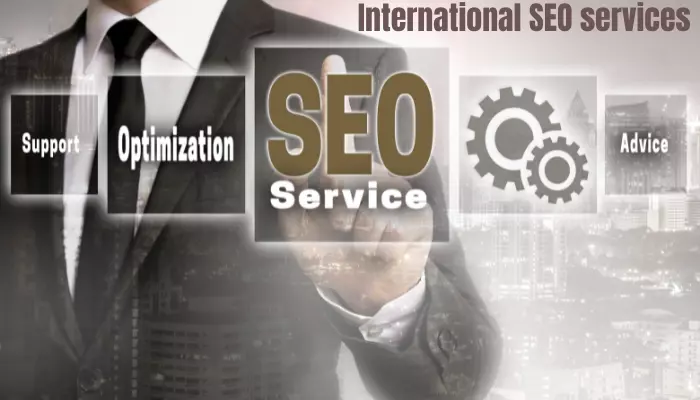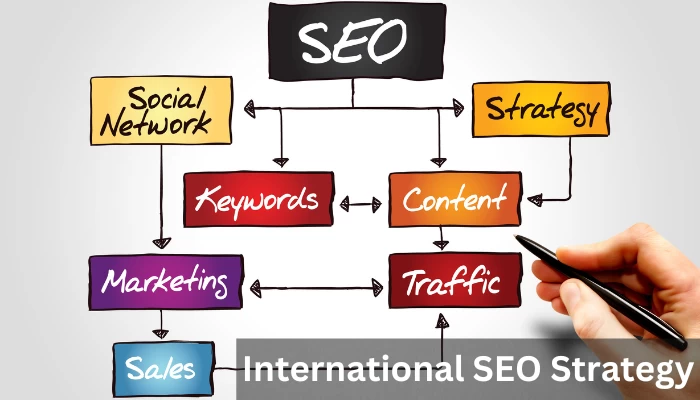Local SEO Services Near Me | Local Pro1 Welcome to...
Unlock Global Markets with International SEO Services
Unlock Global Markets with International SEO Services
International SEO services refer to the specialized strategies and techniques employed by digital marketing experts to optimize a website’s online presence and visibility on a global scale. Unlike traditional SEO, which focuses on local or national markets, international SEO is geared towards reaching a broader and more diverse audience across different countries and regions. Localpro1 provides the best international SEO services as you required.

What Exactly Is International SEO?
Explanation of International SEO: International SEO, or International Search Engine Optimization, is a specialized digital marketing strategy aimed at optimizing a website’s visibility and performance in search engine results for a global audience. It focuses on enhancing a website’s online presence and search rankings in various countries and regions, rather than targeting a single, localized market.
Key Concepts and Components:
Multilingual and Multiregional SEO: International SEO involves creating content in multiple languages and optimizing it for different regions. This may include translations, regional keyword research, and cultural considerations.
Hreflang Tags: Hreflang tags are HTML attributes used to indicate the language and regional targeting of web pages, helping search engines understand which version of a page to display to users in different locations.
International Keyword Research: Identifying relevant keywords for each target market is crucial. It involves understanding how users in different regions search for products and services.
Geotargeting: Geotargeting involves specifying the target audience for different content or pages, ensuring that users in specific countries or regions see the most relevant content.
Content Localization: Adapting content to suit the cultural preferences and needs of the target audience is essential. This may include adjusting images, text, and other elements.
Website Structure: A well-structured website with clear navigation, international sitemaps, and language-specific URLs aids search engines in understanding and ranking international content.
Mobile Optimization: Ensuring that your website is mobile-friendly is critical, as many international users access the internet through mobile devices.
Backlinks and Off-Page SEO: Building international backlinks and local citations helps improve your website’s authority and search engine rankings.
Benefits of Implementing International SEO:
Expanded Global Reach: International SEO allows your website to reach a wider global audience, potentially increasing your customer base and revenue.
Improved Search Engine Rankings: Proper implementation of international SEO strategies can lead to higher search engine rankings in various countries, increasing your online visibility.
Enhanced User Experience: Tailoring content to the preferences and needs of specific regions or languages can improve the user experience and encourage user engagement.
Increased Conversions: Relevance and accessibility in local languages and regions can lead to higher conversion rates as users are more likely to engage with and trust your website.
Competitive Advantage: Implementing international SEO effectively can give you a competitive edge in global markets, especially if your competitors are not optimizing for international audiences.
Better ROI: By reaching the right audience in different regions, you can maximize your return on investment and marketing efforts.
International SEO Strategy

Market Research: Begin by conducting thorough market research to identify target countries or regions. Understand their languages, cultures, and online behaviors. Analyze local competitors and search engine preferences.
Keyword Research: Create a list of relevant keywords for each target market. Use tools like Google Keyword Planner or local keyword research tools to find high-value keywords in the local language.
Website Localization: Optimize your website for international audiences. Translate content accurately, and ensure proper localization of images, videos, and other multimedia elements.
International Domain Strategy: Decide on the structure of your international domains. You can use subdomains (e.g., fr.yourwebsite.com) or subdirectories (e.g., yourwebsite.com/fr/). Make sure to use hreflang tags to indicate language and regional targeting.
Content Creation: Develop unique, valuable, and culturally appropriate content for each target market. This includes blog posts, product descriptions, and other website content.
Technical SEO: Pay attention to technical SEO aspects, such as site speed, mobile optimization, and structured data. Use a Content Delivery Network (CDN) for faster loading times worldwide.
International SEO Best Practices: Implement best practices, such as using canonical tags, managing duplicate content, and optimizing meta tags in the local language.
Backlink Building: Build high-quality backlinks from local and international websites. Collaborate with local influencers, industry leaders, or affiliates to gain visibility in your target markets.
Local SEO: Register your business on local search engines, directories, and review platforms. Maintain accurate NAP (Name, Address, Phone) information across all listings.
Social Media and Multilingual SEO: Create and manage social media profiles in local languages. Utilize multilingual SEO strategies for your social media content.
Performance Tracking: Continuously monitor your international SEO efforts using tools like Google Analytics and Google Search Console. Analyze traffic, conversions, and keyword performance.
Importance of Localization and Globalization:
Localization and globalization are vital components of a successful international SEO strategy:
Localization: Localization involves tailoring your content, products, and marketing strategies to specific local markets. It ensures that your content resonates with the target audience in terms of language, culture, and preferences. Localization enhances user experience and builds trust.
Globalization: Globalization, on the other hand, involves standardizing certain aspects of your business to achieve economies of scale. This can include a consistent global brand message, unified product offerings, and centralized management. Globalization allows you to maintain brand identity while efficiently serving multiple markets.
On-Page and Off-Page SEO Considerations for International Audiences:
When optimizing your website for international audiences, it’s crucial to consider both on-page and off-page SEO elements:
On-Page SEO:
Language and Content: Ensure that content is translated accurately and is culturally relevant. Use hreflang tags to specify the language and region targeting.
Meta Tags: Optimize meta titles and descriptions for local keywords and language.
URL Structure: Use clear, concise, and localized URLs. Avoid using machine-generated strings.
Site Navigation: Create user-friendly navigation menus, making it easy for visitors to switch between languages or regions.
Mobile Optimization: Ensure your website is mobile-responsive, as mobile users are significant in many international markets.
Off-Page SEO:
Backlinks: Build high-quality backlinks from local and international websites, focusing on relevant and authoritative sources.
Social Signals: Engage with local audiences on social media platforms in their preferred language. Encourage shares, likes, and comments.
Online Reputation Management: Monitor and manage online reviews, feedback, and mentions in various languages to maintain a positive reputation.
Local Directories: List your business in local directories, ensuring consistent NAP information across all listings.
International Link Building: Collaborate with local influencers and industry leaders to gain backlinks and visibility.
How Much Does International SEO Cost?
The cost of international SEO (Search Engine Optimization) can vary widely depending on several factors. Some of the key factors that influence the cost of international SEO services include:
Geographic Scope: The number of countries or regions you are targeting will significantly impact the cost. Expanding your SEO efforts to multiple countries typically requires more resources and content localization.
Competitiveness: The level of competition in your target markets plays a significant role in cost. Highly competitive markets may require more extensive SEO strategies, which can be more expensive.
Language and Content: Creating high-quality, localized content in different languages can be costly. Translation, cultural adaptation, and keyword optimization are essential for international SEO success.
Market Research: Understanding local search trends and user behavior in your target markets requires thorough market research. Research costs can vary based on the complexity of the markets.
Technical SEO: Adapting your website’s technical infrastructure for international SEO, including hreflang tags, country-specific domains or subdirectories, and mobile-friendliness, may involve additional costs.
SEO Strategy: The chosen SEO strategy, such as on-page optimization, off-page link building, and local SEO, can affect the overall cost. Some strategies are more labor-intensive and, therefore, costlier.
Agency or In-House: Hiring an SEO agency or building an in-house team will have different cost structures. Agencies often charge fees, while in-house SEO requires hiring and training staff.
Tools and Resources: SEO tools and resources for keyword research, analytics, and tracking may incur additional costs.
Reporting and Analysis: Regular reporting and analysis of SEO performance are crucial for international SEO success. These activities may require budget allocation.
Budgeting for International SEO Services:
To budget for international SEO services, consider the following steps:
Define Goals: Clearly define your international SEO objectives, whether it’s brand exposure, lead generation, or e-commerce sales. Your goals will influence the budget.
Market Analysis: Conduct thorough market research to identify the potential and competitiveness of your target markets. This will help determine the scale of your SEO efforts.
Content and Localization: Budget for content creation, translation, and cultural adaptation. High-quality, relevant content is essential for international SEO success.
Technical Infrastructure: Allocate funds for technical SEO improvements to ensure that your website is optimized for international audiences.
SEO Tools and Resources: Consider the costs of SEO tools, analytics software, and reporting platforms to support your efforts.
Agency or In-House: Decide whether to hire an SEO agency or build an in-house team. Compare their costs and capabilities.
ROI Expectations: Consider the expected return on investment (ROI) to determine the budget you are willing to allocate for international SEO.
Ongoing Maintenance: Remember that international SEO is an ongoing effort. Budget for continuous optimization, updates, and monitoring.
Cost vs. ROI in International SEO:
Balancing the cost of international SEO with the expected return on investment is crucial. Here’s how to evaluate cost vs. ROI:
ROI Projections: Estimate the potential ROI based on your goals. Consider factors like increased organic traffic, conversions, and revenue.
Benchmarking: Compare the expected ROI with the costs involved in international SEO to assess the feasibility of the investment.
Long-Term Perspective: International SEO is not an immediate solution. Consider the long-term benefits and factor in the time it takes to see substantial results.
Cost Control: Continuously monitor your international SEO campaign to control costs and make necessary adjustments to improve ROI.
Adaptability: Be prepared to adapt your strategy as needed based on actual performance data to maximize ROI.
How Long Do International SEO Services Take to Work?

The timeline for seeing results from international SEO services can vary based on several factors. It’s important to note that SEO is a long-term strategy, and significant improvements may not happen overnight. Here are some factors that can influence the timeline:
Competitiveness of Keywords: If you’re targeting highly competitive keywords, it may take longer to see results. Ranking for competitive terms requires more time and effort.
Website Authority: The current authority of your website plays a role. New websites or those with low authority might take longer to gain visibility.
Content Quality and Relevance: Creating high-quality, relevant content is crucial. Search engines prioritise content that adds value to users. If your content is well-optimised and valuable, you may see quicker results.
Technical SEO Factors: Addressing technical SEO issues promptly can lead to faster improvements. This includes optimising site structure, improving page speed, and ensuring mobile-friendliness.
Backlink Profile: Building a strong and diverse backlink profile is important. Quality backlinks from reputable sources can positively impact your rankings over time.
Local Market Understanding: Understanding the nuances of the target international markets is crucial. Adapting your strategy to local preferences and search behaviours can expedite the process.
Algorithm Updates: Search engines regularly update their algorithms. Sometimes, changes in algorithms can affect your rankings. Adapting to these updates is part of the ongoing SEO process.
Consistency and Patience: SEO is an ongoing effort. Consistency in optimization efforts, combined with patience, is key. Results may start to show in a few months, but significant improvements often take six months to a year or more.
Analytics and Monitoring: Regularly monitor your website’s performance using analytics tools. Adjust your strategy based on the data to enhance the effectiveness of your international SEO efforts.
Conclusion
In conclusion, International SEO services play a pivotal role in the success of businesses operating on a global scale. These services are designed to optimize a company’s online presence and visibility in international markets, enabling them to reach a broader and more diverse audience. Feel free to contact us for any type of query or the services related to the international SEO services.
FAQs
What Is International Seo?
International SEO (Search Engine Optimization) refers to the practice of optimising a website to attract and engage a global audience. It involves strategies and techniques that help websites rank higher in search engine results across different countries and languages.
Why Is International Seo Important For Businesses?
International SEO is crucial for businesses looking to expand their online presence globally. It helps increase visibility in various markets, attracts international customers, and boosts overall brand recognition on a global scale.
What Services Are Typically Included In International Seo Offerings?
International SEO services may include keyword research, multilingual content optimization, hreflang tag implementation, international link building, local citation management, and website localization to cater to diverse audiences.
How Does International Seo Differ From Local Or National Seo?
While local and national SEO focus on specific geographic regions, International SEO targets a global audience. It involves addressing language barriers, cultural nuances, and optimising for search engines in different countries.
What Is The Importance Of Multilingual Seo In An International Strategy?
Multilingual SEO involves optimising content for multiple languages. This is vital for reaching diverse audiences, enhancing user experience, and ensuring that search engines understand and index content correctly in various languages.
Our Services
Our Latest Posts
PPC White Label Services by Local Pro1 | Expert Solutions
PPC White Label Services by Local Pro1 | Expert Solutions...



